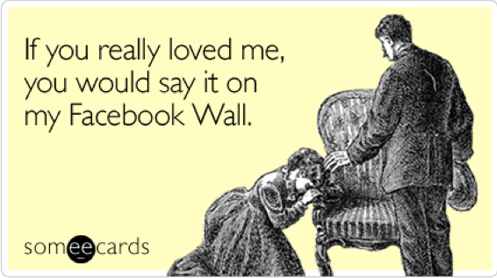F’n woke up this morning at about 3:44am. Normally when I do that, I go get some water, maybe pee, and then go back to sleep. That works 8 times out of 10. This morning was one of two times it didn’t. I lay there for a while, thinking about work, thinking about my life, whatever. After about 45 minutes, I gave up. I went outside and emptied the dishwasher, fired up the laptop, looked around at some Serial conspiracy theories, messed around on social media, considered writing a post for this blog, didn’t, and then went to the gym. Came back, and on the walk back — despite just exercising for 1 hour — I started having these creeping feelings of self-doubt. This happens to me a lot, so it’s not necessarily a new thing, but the form this time was that I felt irrelevant. Like I felt — does anyone really care that I’m around this holiday season? It was depressing. After a while, I mostly shook it off. Admittedly, aspects of it are still in my head as I start writing this. But then I came across something interesting, and it made me feel a little bit better.
Stanford Business School has a roundup of 10 great posts from the year, and this is one of them. It’s about networking. I’m inherently interested in anything related to networking. It took me forever to get a job out of graduate school — I didn’t sign an offer until about a month after I even graduated — and in the process, I developed a couple of my own theories about networking.
The lady who wrote this article, Heidi Roizen, is considered somewhat of a networking expert.
This is a very BuzzFeed-type article in that it gives a list of reasons and ways to look at networking, etc. But there is one part that stands out to me above all else. She says:
“Social media has allowed us to have broader relationships, but at the end of the day, human relationships haven’t changed.”
This goes back a little bit to the idea of Dunbar’s Number, which I once wrote about before. Dunbar’s Number basically says you can maintain about 100-200 (it varies by person) relationships in your life at any given time. If you have 200 connections on LinkedIn, 200 followers on Twitter, and 200 friends on Facebook — and let’s assume 70 people overlap all three lists — that’s still about 360 connections. You can’t realistically maintain that, as in, they’re just numbers at some point. They’re not people you interact with, and based on algorithms, you probably don’t even see their content either.
I think people get confused by this often, honestly.
Social media isn’t a real relationship.
Relationships are basically everything in life — personally and professionally — to the point where you should even go as far as to construe them as living, breathing things. Nurture them. (That’s in my link above.) Social media relationships are not that. Different social networks offer different things, but oftentimes it’s people you don’t know, or people whose opinions you respect, and they’re sending out content about themselves anyway.
It’s not an actual relationship.
You don’t get paid in likes, shares, and clicks. Remember that.
I think one of the most ironic things about the rise of technology and social connectedness is that it’s made us feel so much closer — in that I basically know one of my friends just checked into a movie in St. Louis, which I had no way of knowing even a few years ago — but it can also make us feel much further apart. That sounds like a tremendously trite argument, and in ways it is, but in other ways it’s also true.
Your real relationships — family, friends — are things you put heart into. Your social media relationships are people you share information and fun stuff with. It’s different.
Just because you have 1,000 Twitter followers, that doesn’t necessarily mean 1,000 people believe in what you’re doing/saying. It might not mean anything, honestly. The point is — sure, it maybe can help you a little with your business (“LEAD GEN!”) or interacting with some people you want to be in front of, but following someone on Twitter and exchanging a few tweets with them doesn’t constitute an actual relationship.
Social media changed the process. It didn’t change the fundamental nature of human interaction.
My sister-in-law and mother-in-law seem to get this confused a decent amount. At Thanksgiving, they would sit around and count the likes/comments on certain photos they had posted. They were half-joking, and it’s all good. But sometimes you’d hear “Oh, look at the comment by so-and-so!” It felt so weird — there were real people sitting there, people who one of them had birthed, and instead we were commenting on and waiting for remarks from people in another place. I didn’t really know how to process it.
All the stuff in Roizen’s article is interesting in terms of how to construe and approach networking, and you should definitely read it. But if you take one thing from it, remember the crux is this:
Social media isn’t a real human relationship.

Reblogged this on Hot Buttered fun!.